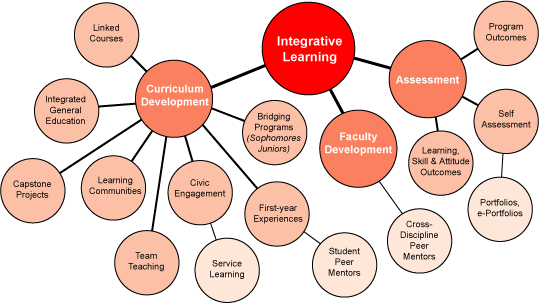Assessment |
Biopsychology |
Comparative |
Cognitive |
Developmental |
Language |
Individual differences |
Personality |
Philosophy |
Social |
Methods |
Statistics |
Clinical |
Educational |
Industrial |
Professional items |
World psychology |
Educational Psychology: Assessment · Issues · Theory & research · Techniques · Techniques X subject · Special Ed. · Pastoral

Concept map describing activities offered by universities to encourage integrative learning.
Integrative learning is a learning theory describing a movement toward integrated lessons helping students make connections across curricula. This higher education concept is distinct from the elementary and high school "integrated curriculum" movement.
The "term comes in many varieties: connecting skills and knowledge from multiple sources and experiences; applying skills and practices in various settings; utilyzing diverse and even contradictory points of view; and, understanding issues and positions contextually."
"...making connections within a major, between fields, between curriculum, cocurriculum, or between academic knowledge and practice."
From Huber, M. T., Hutchings, P., & Gale, R. (2005). Integrative Learning for Liberal Education. peerReview, Summer/Fall.
References[]
- Brinkman, G. W., & van der Geest, T. M. (2003). Assessment of Communication Competencies in Engineering Design Projects. Technical Communication Quarterly, 12(1), 67-81.
- Czechowski, J. (2003). An Integrated Approach to Liberal Learning. Peer Review
5(4), 4-7.
- Grace, D. J., & Picard, A. (2001). An Experimental Approach to Integrating Mathematics and Literacy Methods Courses. Action in Teacher Education, 23(1), 29-36.
- Graff, G. (1991, February 13). Colleges are Depriving Students of a Connected View of Scholarship. The Chronicle of Higher Education, p. 48.
- Hecke, G. R. V., Karukstis, K. K., Haskell, R. C., McFadden, C. S., & Wettack, F. S. (2002). An Integration of Chemistry, Biology, and Physics: The Interdisciplinary Laboratory. Journal of Chemical Education, 79(7), 837-844.
- Huber, M. T., & Hutchings, P. (2004). Integrative Learning: Mapping the Terrain. The Academy in Transition. Washington, DC.: Association of American Colleges and Universities
- Huber, M. T., Hutchings, P., & Gale, R. (2005). Integrative Learning for Liberal Education. peerReview, Summer / Fall.
- Jacobs, S. K., Rosenfeld, P., & Haber, J. (2003). Information Literacy as the Foundation for Evidence-Based Practice in Graduate Nursing Education: A Curriculum-Integrated Approach. Journal of Professional Nursing, 19(5), 320-328.
- Jennings, T. E. (1997). Restructuring for integrative education: multiple perspectives, multiple contexts. Westport, Conn: Bergin & Garvey.
- Jory, B. (Ed.). (2001). Campbell Monograph Series on Education and Human Sciences (Vol. 2).
- Kain, D. L. (1993). Cabbages--And Kings: Research Directions in Integrated /Interdisciplinary Curriculum. Journal of Educational Thought/Revue de la Pensee Educative, 27(3), 312-331.
- Kirtland, J., & Hoh, P. S. (2002). Integrating Mathematics and Composition Instruction. Primus, 12(1).
- Klein, J. T. (1996). Crossing boundaries: knowledge, disciplinarities, and interdisciplinarities: University Press of Virginia.
- Klein, J. T. (1999). Mapping interdisciplinary studies. Washington, DC. : Association of American Colleges and Universities.
- Klein, J. T. (2005). Humanities, Culture, and Interdisciplinarity: The Changing American Academy: State University of New York Press.
- Lorents, A., Morgan, J., & Tallman, G. (2003). The Impact of Course Integration on Student Grades. Journal of Education for Business, 78(3), 135-138
- Matthews, M. W., & Rainer, J. D. (2001). The Quandaries of Teachers and Teacher Educators in Integrating Literacy and Mathematics. Language Arts, 78(4), 357-364
- Roberts, J. A. (2004). Riding the Momentum: Interdisciplinary Research Centers to Interdisciplinary Graduate Programs. Paper presented at the July 2004 Merrill conference.
- Roberts, J. A., & Barnhill, R. E. (2001, Oct 10-13). Engineering Togetherness (An Incentive System for Interdisciplinary Research). Paper presented at the 2001 IEEE/ASEE Frontiers in Education Conference, Reno, NV.
- Scott, D. K. (2002). General Education for an Integrative Age. Higher Education Policy, 15(1), 7-18.
- Shapiro, D. F. (2003). Facilitating Holistic Curriculum Development. Assessment & Evaluation in Higher Education, 28(4), 423-434.
- Shore, M. A., & Shore, J. B. (2003). An Integrative Curriculum Approach to Developmental Mathematics and the Health Professions Using Problem Based Learning. Mathematics and Computer Education, 37(1), 29-38.
- Stefanou, C. R., & Salisbury-Glennon, J. D. (2002). Developing Motivation and Cognitive Learning Strategies through an Undergraduate Learning Community. Learning Environments Research, 5(1), 77-97
- Venville, G. J., Wallace, J., Rennie, L. J., & Malone, J. A. (2002). Curriculum Integration: Eroding the High Ground of Science as a School Subject? Studies in Science Education, 37, 43-83.
- Viswat, L. J., Duppenthaler, C. E., Nishi, K., & Podziewski, K. (2003). A Pilot Study on a Coordinated Approach to Language Instruction. Bulletin of the Educational Research Institute, 21, 79-92.
- Walker, D. (1996). Integrative Education. Eugene OR: ERIC Clearinghouse on Educational Management.
External sites[]
- Association for Integrative Studies
- Institute for Advanced Study in the Integrative Sciences
- Integrative Learning: Opportunities to Connect collaborative project at the American Association of Colleges and Universities
- Hybridvigor.net
See Also[]
- Andragogy
- The Carnegie Foundation for the Advancement of Teaching
- Curriculum
- Experiential learning
- Higher Education
- Integral Institute
- Interdisciplinarity
- Learning Theory
- Pedagogy
- Service learning
- Universities
- Wikiportal University Portal
| This page uses Creative Commons Licensed content from Wikipedia (view authors). |